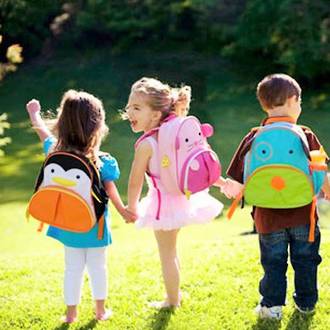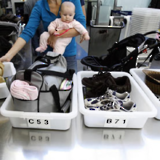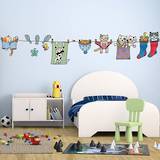Shop
01472
https://www.under5s.co.nz/shop/Hot+Topics+Articles/General+Topics/12+Tips+for+starting+school.html
12 Tips for starting school
|
For both parents and children, the transition to primary school is an enormous milestone. Find out what you can do to help support your child when their first day finally arrives and during those first few weeks.
|
You might also be interested in ...
Getting through airport security with young kids
Going through airport security is usually a fairly mundane procedure, but when you have young kids in tow you may need to do a little more planning! These useful tips will help make getting through airport security a little less stressful next time you fly with small children.
9 Tips on painting kids rooms
Is it time to decorate your kids bedroom? When it comes to painting kids rooms, it may sound like fun, but you'll find it's more than just choosing a paint colour. Painting and decorating can be hard work, but with a little preparation up front it won't feel so daunting. Have a look a these tips from choosing paint colours to finding décor and accessories to suit their rooms and grow with them.
join usJoin us on social media for all our latest news. |
sign upSign up and receive our latest newsletters. |
|







Find out what you can do to help support your child when their first day finally arrives and during those first few weeks.
12 Tips for starting school
1. Manage your approach
Parents all approach this new situation differently. Some with eagerness, some with grief that those special early years are gone and their ‘baby’ is growing up.
No feeling is right or wrong, it just reflects the unique personalities we have and how we react to change.
Your child will look to your emotions to gauge the situation. If they see you nervous or tearful this will leave them with the feeling of anxiety.
Equally talking about school all the time and being over excited can put a lot of pressure on this change.
2. Keep to your usual routines
On your little one's first day, amidst the excitement of a new uniform, school bag and packed lunch, try to keep to your usual morning routines and have what you normally have for breakfast.
Don't just talk about school, try to talk about other topics as well.
Allow plenty of time to get to school so you can avoid any stress and arrive before the bell.
3. Be guided by your child
When you arrive at school, if your little one stands close to you then stay close to them and give them reassurance.
But if they run off in search of friends or to play in the playground then step back and let them go for it!
4. Keep the goodbye brief
Your child’s teacher can give you guidance on how to say goodbye on that first day, but usually a quick hug and confident, “See you this afternoon, have a great day,” is best, then walk away.
5. Do pick up for the first week
It might not always be possible if you work full time, but see if you are able to adjust your hours for that first week so you can pick up your child or if you can’t make it, someone else close to your child.
It's a big week for them, and knowing you'll be there at the end of the day will help ease the pressure.
Perhaps bear in mind too that starting afterschool care and school all in the same week can be quite a lot for a child, so perhaps delay after school care for a week or two until they're settled.
6. Share your child's interests & strengths
Does your child love painting or have a fascination with dinosaurs?
Share this with their teacher so they can be incorporated where possible into school life.
Your child may also like to take things from home to school for ‘news’ as this strengthens the connection between home and school.
7. Don't plan too much
During the first few weeks, don't try to plan too many after school activities.
You will be surprised how tired your child is after school even if they have been used to a full day at daycare.
It will be much more comforting for them to come home to a healthy snack and time to play in their own space rather than rushing off to swimming lessons or the supermarket.
8. Try to do homework before dinner
When your child gets home give them an hour or so to unwind and play and then start homework, ideally before dinner.
Their concentration levels will make it difficult to do homework as they become more tired and the evening progresses.
9. Manage negative stories about school
If your child does come home with a negative story about school, be calm.
Try not to lecture with words like - “No you don’t, school is fun.” Empathise first and ask your child why they feel that way.It may be that one child has been mean to them or they found a particular lesson hard.
Acknowledge their feelings and then ask them for their ideas on what to do about it. You might be surprised with what good ideas they can come up with when encouraged.
Then ask your child if they can think of one thing they did enjoy that day and talk more about that.
10. Keep their teacher informed
A two way relationship between home and school is good for your child.
If communication channels stay open, you are able to find out from your teacher if things aren’t going as well as planned.
The same is true for them - if you can let them know what’s going on in your child’s life, they will be able to understand your child better and meet their needs.
11. Become involved
If it's possible, take an active role and be part of your child’s school life.
Go to sports days or an assembly or if you can’t make it perhaps send Nana or Grandad along instead.This will show your child that you are interested and also gives you an insight to their life at school.
Perhaps ask your child if they would like to invite some children from their class home too for a play date to help build on their new friendships.
12. Remembering how far they've come
Before your little one starts on a new journey it’s good to look back at where they’ve been.
Get out those baby books and children’s portfolio’s and celebrate those early years. You may find that your child wants to share in this too.
Soon you will have some new school adventures and memories to add.
More Hot Topics for you to enjoy
Tell your friends
Like the article you've just been reading? Click on the Refer A Friend link at the top of the page and send the details to friends who might like to read it too.Source: This article has been written by Creators, a nationwide service offering quality home-based care and education. Creators are passionate about seeing every child’s unique talent being recognized and nurtured.
Image source: kpronetwork